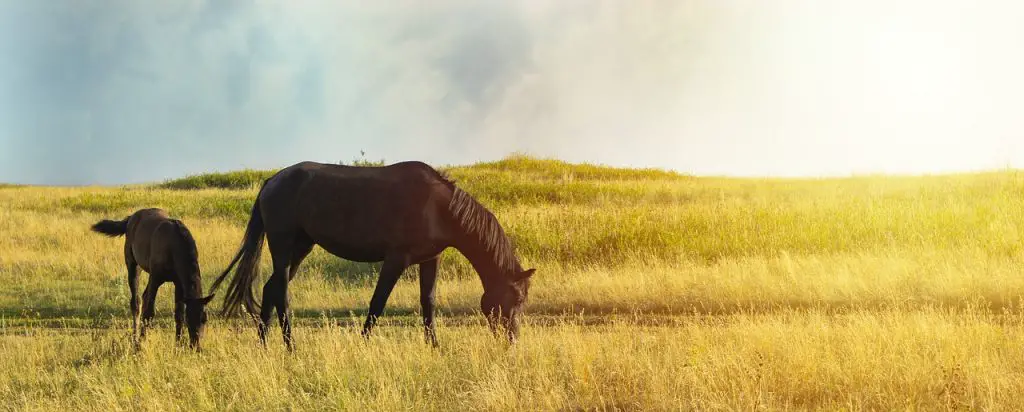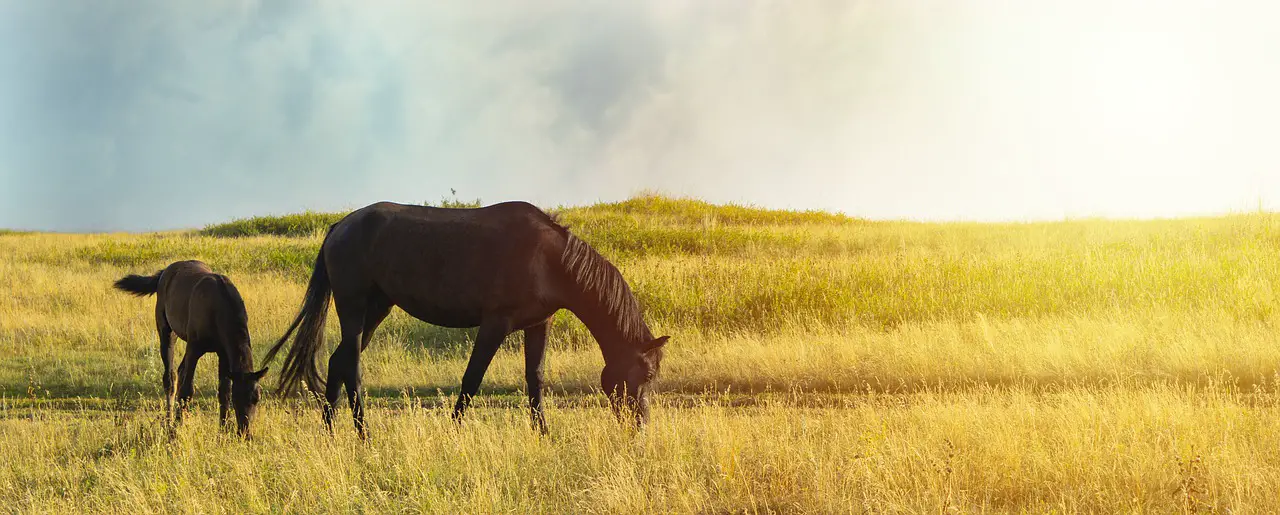Last Updated on February 23, 2022 by Allison Price
My friend feeds her horses Bermuda Hay. Her horses are radiant with health. They have beautiful coats, great bodies and lots of energy. I was struck by the health of her horses and wondered if Bermuda hay is as nutritious as other types.
Bermuda hay is good to horses because it’s high fiber, which allows horses to eat and absorb nutrients. A diet solely based on Bermuda hay would not provide horses with the required protein, or the essential minerals and vitamins they need.
Horse owners are reluctant to feed their horses Bermuda hay as they fear it will cause colic. Do you think this is true? How does Bermuda stack up against other standard forages such as timothy or orchard grass. Let’s see.
This is the first article in a series I wrote on horse hay. The main article is Horse Hay – An Owner’s Guide.
Is Bermuda the best hay for horses?
Bermuda grass is a hay source that has been a major source of hay in the US’ southern region for over two centuries. Over the years, many varieties of Bermuda grasses were introduced.
Bermuda grass grows easily
Alicia Bermuda grass is a popular choice in south Louisiana because it’s perennial, easy to grow, and doesn’t require much labor.
Bermuda grass can grow well in a variety of soils. Bermuda grass can withstand extreme soil conditions such as drought, heat and fertilization. It is also more efficient at utilizing water than other cool-season grasses like orchard grass.
Bermuda hay is affordable
Because of its low cost and availability, Bermuda is very popular. However, Bermuda varieties aren’t too far behind more popular grasses like orchard and timothy in terms of nutritional value.
Combine Bermuda and a legume hay.
Your grass hay can be beneficial to horses by including 40% to 50% legumes. This combination is vital for horse digestion and provides the horse with the required amount of fiber, protein and other nutrients.
Introduce a horse to Bermuda Hay slowly. In a few weeks, any potential problems your horse might have should be apparent. Bermuda grass, which is cool-season hay, is an excellent choice.
To aid digestion, I prefer Bermuda’s first cuttings to be fed to my horses. Bermuda grass does not contain all the vitamins, minerals and nutrients horses require.
Does Bermuda hay cause colic?
Colic is an often-reported symptom in horses. Although there are many causes, most people associate it with Bermuda Hay in horses’ diets.
A few years back, I stopped using Bermuda hay due to rumours that it could cause digestive problems such as colic. Impaction of food at end of small intestine is one cause of colic in horses.
Impaction colic can often be attributed to what the horse ate before it became painful. This type of colic seems to be more common in the Southeast United States than elsewhere.
In the South, Bermuda hay is most common, so many horses who visit the vet have Bermuda grass. People began to believe that Bermuda caused colic.
This theory is not supported by any scientific evidence. Warm-season grasses like Bermuda may allow horses to maximize nutrient absorption from their diets.
Colic is a condition where your horse consumes too much indigestible fiber. Different factors can make fiber indigestible. Low-quality feed, mold or dust accumulated in hay are bad ideas for horses’ digestive systems.
Fine-stemmed hay can also increase the risk of food getting stuck to the stomach. The stems can cause hair loss and block the drain. There are many Bermuda grass varieties. Some of the more delicate Bermuda grasses, like Alicia or Coastal, may have earned the Bermuda family a poor reputation.

You can choose Bermuda hay with courser stems such as Brazos or Tifton 85 if you are concerned about your horse’s health. You should also consider the neutral detergent fiber (NDF), content in your hay.
NDF is a measure of how easily the forage can be digested. NDF is a measure of how difficult it is for horses to digest the food. It is the most difficult for mature Bermuda hay to digest. It’s best to choose younger Bermuda hay for easier digestion.
A change in diet can cause colic in horses. A sudden change in diet can lead to colic. The gut bacteria needs time to adapt to new foods.
Horses need to have access to water even when they’re not in the barn. Colic is more common in horses that must go to the barn for water.
Bermuda vs. Alfalfa Hay
Alfa hay usually contains more protein that Bermuda hay. Horses feel fuller before they absorb all nutrients.
Bermuda horses are not overly stimulated by hay and will eat less hay if they have had a little. Horses with older horses may also experience problems with their kidneys from too much protein.
Horses can become toxic if they eat a diet that is mainly alfalfa. Unhealthy protein-rich diets can lead to symptoms such as excessive sweating, aggression, spooking, or cloudy urine.
This can be countered by mixing alfalfa and Bermuda, which has low levels of proteins. Alfalfa is a favorite food of horses, so it’s important to store it in a safe place. Horses that have unlimited access to a bale of alfalfa will eat too much and get sick.
Alfalfa has a higher calcium content than other types of hay. It is essential to maintain the calcium-to-phosphorous ratio in any horse’s diet. You might notice your horse becoming weaker or trembling if calcium is more plentiful than phosphorous.
Bermuda, however, has a lower but more stable level of calcium. To maintain the best balance, it is best to combine hays. Unwanted weight gain is possible due to alfalfa’s extra calories.
Horses can become fat if they eat too many calories. Bermuda is an excellent choice for horses who want to keep their weight down and eat enough food.
Bermuda vs. Timothy Hay
Timothy Hay is another popular horsehay. It has a high fiber content, and lower calcium levels than Bermuda. It’s a good source for minerals such as copper and zinc and, like Bermuda, has small amounts of protein.
However, I have had to deal with horses who don’t like timothy. These horses are fed a mixture of Bermuda orchard or Bermuda hay and legume hay. This gives them a better texture while still providing their basic nutritional needs.
Timothy is a cool-season grass. Its usual growing season is in the late summer. Fall is a great time to seed because it is more resistant to cold and has fewer weeds.
Bermuda, on the other hand, is most productive when it is warm. It can be grown in any place with sufficient moisture, particularly in the southern US.
The biggest difference between Bermuda and Timothy I have seen is pricing for the bale. Timothy grass is only capable of producing two cuts per year on average. This creates higher prices during peak season.
The first cut usually contains the most weed of the two. Growing timothy requires a lot of water, compared to other forages such as Bermuda.
You will also find that there is a limited supply due to the traditional demand for timothy. Globally, there aren’t many timothy growers. The largest being in the USA and Canada.
Timothy is often shipped long distances and has high import and delivery costs. Bermuda hay is a simpler and cheaper alternative.
Bermuda vs. Orchard Grass
Orchard-grass has about 12% protein, which is slightly more than Bermuda. It has a higher calorie count per pound, and an acceptable balance of calcium-phosphorous.
It’s similar to Bermuda and a good choice for horses. It is lacking in energy, calcium and vitamin A. A diet that includes both grass and legumes hays is the best for horses.
Bermuda grass is more efficient at consuming water and producing forage. The Bermuda grasses of the Coastal and Hybrid regions often produce 30% to 50% more food per inch than those grown in taller grasses such as orchard grass.
Orchard-grass is moderately susceptible to droughts. It isn’t as winter hardy as other cool-season grasses. This is why special care must be taken when it is established.
Orchard grass has a similar fiber content to Bermuda hay. Horses need fiber to maintain a healthy gut.
A high fiber content helps keep the gut full, while a lack of fiber can lead to various health problems. Orchard has a sweeter smell than other Bermuda grass varieties and a delicate texture.
Overall orchard grass hay is a great hay for horses.


